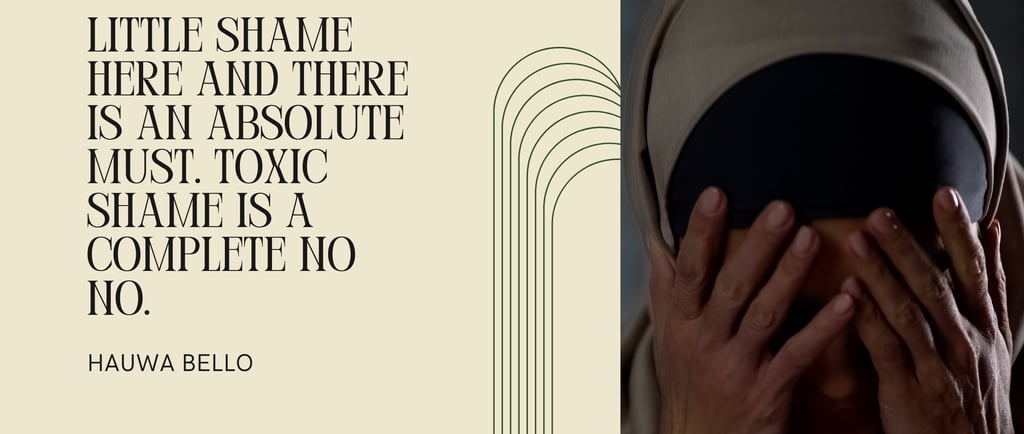Embrace the Power of Healthy Shame
Explore the nuanced landscape of shame as we delve into the transformative potential of healthy shame while rejecting the toxic aspects that hinder personal growth. Join the journey towards self-compassion, acknowledging imperfections, and finding a delicate balance that fosters resilience and compassion in the realm of shame.
6/4/20233 min read


In a world that champions self-expression and authenticity, the concept of shame often receives negative connotations. However, beneath the surface, there lies a crucial distinction between toxic shame and the transformative power of a little shame here and there. Today I would like to explore the importance of acknowledging and embracing healthy shame, while categorically denouncing the toxic aspects that hinder personal growth and well-being.
The Value of Healthy Shame:
Healthy shame serves as a guiding force that deters individuals from engaging in sinful actions. Without a sense of shame, individuals lack an internal compass to distinguish between good and bad behaviour, allowing them to pursue any desires without restraint. Interestingly, as one continues to indulge in sinful acts, their sense of healthy shame diminishes, potentially vanishing entirely. No wonder the greatest of all prophets once said, “… If you feel no shame, then do as you wish.” Prophet Mohammed SAW
Healthy shame also is an intrinsic part of our conscience, reminding us of when we have fallen short of our values or caused harm to others. Healthy shame helps us acknowledge our mistakes, and acknowledging our mistakes while also taking responsibility helps us foster compassion and building of more robust bonds with those around us.
A Catalyst for Growth:
Just as a garden thrives when weeds are uprooted, our personal development flourishes when we humbly address our imperfections. As psychologist, Dr. Jordan B. Peterson aptly remarked, “If you don’t admit a mistake, you can’t learn from it.” Healthy shame prompts us to confront our shortcomings, enabling us to learn from our errors and grow as individuals. We unlock our potential for personal transformation and self-actualization by embracing this essential component of our humanity.
Toxic Shame’s Harmful Grip:
While healthy shame encourages growth, toxic shame engulfs us in a suffocating embrace of self-deprecation. Unlike its constructive counterpart, toxic shame stems from an external or internalized judgment that undermines our sense of self-worth. It shackles us in a vicious cycle of guilt and self-blame, preventing us from embracing vulnerability or seeking help. As the renowned psychiatrist, Dr. Gabor Maté asserts, “Toxic shame is one of the most corrosive and destructive forces in human life. It lies at the root of all forms of addiction and all self-destructive behaviour.” Recognizing and rejecting toxic shame is crucial for our mental well-being and personal liberation.
I have found that Toxic shame reduces your creativity and hinders your full expression. Some clients I have worked with who had toxic shame went as far as no longer expressing themselves in a particular form of art or creative endeavours for fear of experiencing the same kind of shame they experienced from negative feedback they had received about some work of art or creative pieces they had produced. I agree with Dr Gabor Maté on toxic shame as a sign of trauma. Behind all clients who suffer from toxic shame, I have found one or more traumatic experiences surrounding their shame.
Finding Balance:
In our journey towards personal growth, we must strike a delicate balance between acknowledging healthy shame and discarding toxic shame. Healthy shame encourages us to take responsibility and make amends. In contrast, toxic shame traps us in a web of self-loathing. Let us heed Brené Brown’s words: “Vulnerability is not winning or losing; it’s having the courage to show up and be seen when we have no control over the outcome.” By cultivating self-compassion and embracing vulnerability, we can navigate the realm of shame with wisdom and grace.
So in a society that often dismisses shame as something to be eradicated entirely, it is essential to recognize the nuanced nature of this emotion. Little shame here and there can be a powerful catalyst for growth and connection, helping us foster empathy and humility. However, we must remain vigilant in identifying and rejecting toxic shame, as it impedes our progress and well-being. By understanding the distinction and harnessing the transformative power of healthy shame, we can navigate our personal journeys with resilience and compassion.
Hauwa Bello... Empowering thee
Clinical health psychologist
Founder and CEO of mumtaz mind and wellness studio

